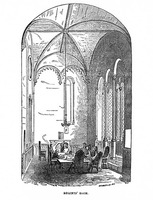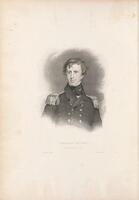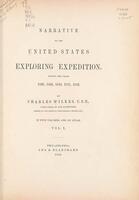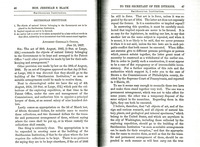The National Museum is becoming a reality
Henry wasn’t against a national library, only against it being under the purview of the Smithsonian. He believed that as much of the funds as possible should go towards research, and that the library should only be for support while Jewett was of the opinion that public libraries were a necessity in order for anyone to do research. In January 1847, The Board of Regents had agreed to divide the annual funds in order to build up the library and museum collections, upon completion of the building, while the rest of the annual interest was directed for the presentation and publications of original research and lectures. As the building neared completion, the fight over the library became contentious. It had become clear that both Assistant Secretary Jewett and advocates for a national library believed it was the intent of Congress to establish the Smithsonian as the national library and to apportion funds of $25,000, which was over eighty percent of the funds for the Smithsonian. Henry continued to worry over the allocation of money, especially considering the amount that had been spent building the Smithsonian Castle. By 1852, he was seriously considering dissolving the Smithsonian annual income compromise of 1847, in order to ensure that what he valued most would be secure, telling others, “I am now resolved that nothing shall stand in the way of the publications. Libraries and museums must be collected and supported by other means particularly by those of the General Government (Henry, siarchives).” The dispute between Henry and Jewett became public, wrapped up in the broader national partisan disputes over the role of government. For over a year their fight was carried out in newspapers, in literary journals, and in Congress, as both Henry and Jewett were fighting for allies. It was a clear indication of how politics in Washington, D.C. worked, when supporters of the library were suddenly quiet. Jewett had taken a political gamble and lost, fired by Henry in 1854 for insubordination. Congress threw their support behind Henry and recommended rescinding the compromise of 1847, which the Board of Regents upheld, ultimately concluding that funding for a national library would not fulfill the intent of Smithson.
1857 Compromise
Joseph Henry won that round, but collections and national treasures continued to proliferate. Henry had been opposed to the Smithsonian becoming a warehouse of objects, yet the national museum of the Smithsonian was slowly increasing. They were also outgrowing the space at the US Patent Office where exhibits were on display and Henry was forced to make concessions. During his fifteenth month fight with Charles Jewett, he had let his attention to his meteorology program falter. When he realized it needed more money than he had anticipated, he acquiesced to another compromise from Congress. In exchange for accepting the Wilkes Expedition Exhibit from the Patent Office, he reluctantly agreed to accept funds from Congress.
“On March 3, 1857, the appropriation act providing funds for the transfer of the national collections in the Patent Office Building to the Smithsonian was passed. With appropriated funds available to the Smithsonian for the first time, albeit indirectly through the Interior Department, a new era had begun in Smithsonian history. And Joseph Henry had made a miscalculation. He believed that in time the federal government would recognize its obligations and take full responsibility for the national collections, thus freeing the Smithsonian of the burden of their care. He failed to realize that in Washington some actions are irreversible (Rothenberg, xxxii).” Smithsonian historian Heather Ewing described the compromise as “a decision that would have an extraordinary impact on the future direction of the Smithsonian (Ewing, 332).” Spencer Baird, assistant to Henry overseeing the museum collections, knew better than Jewett how to play the political game, and wisely stayed in the background during the fight over the library. He proved his loyalty to Henry, and it eventually paid off.
Fire broke out in the Smithsonian building in 1865. Tragically, all of the papers of James Smithson were lost, as well as thousands of letters of Joseph Henry, along with other collections. But Henry took advantage and used the fire as an opportunity to solidify his personal agenda of a smaller, researched based Smithsonian Institution by winnowing the number of items in the building. He convinced William Corcoran, a wealthy Washington businessman, to fund a private art gallery and take the art collection from the Smithsonian building. And he moved much of the library collection of books to the Library of Congress.




